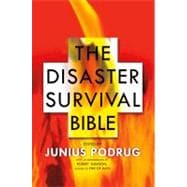
JUNIUS PODRUG has experienced two major earthquakes, a flash flood, a blizzard of historical significance, a shipboard emergency, and a crazy with a gun. He considers his paranoia to be heightened awareness and habitually checks where the life vests are stored when boarding a ship and where the fire escapes are located before unpacking in a hotel room. He is an accomplished writer of both fiction and nonfiction. He lives on Cape Cod.
The New copy of this book will include any supplemental materials advertised. Please check the title of the book to determine if it should include any access cards, study guides, lab manuals, CDs, etc.
The Used, Rental and eBook copies of this book are not guaranteed to include any supplemental materials. Typically, only the book itself is included. This is true even if the title states it includes any access cards, study guides, lab manuals, CDs, etc.